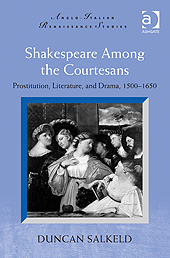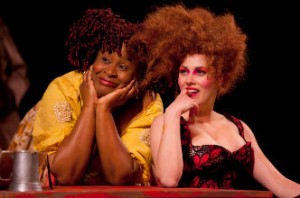 Since Eric Partridge’s 1968 book Shakespeare’s Bawdy the subject of sex in Shakespeare has been commonplace. With titles including words like “desire”, “eroticism”, and “sexuality” the reader knows what to expect, but both the jacket image and the title of Duncan Salkeld’s new book Shakespeare among the Courtesans: Prostitution, Literature, and Drama, 1500-1650 indicate that this might be a rather demure look at the issue. But Salkeld’s book describes the realities of the early modern sex trade which was known to Shakespeare. It also raises uncomfortable questions about the extent to which this shady world still exists.
Since Eric Partridge’s 1968 book Shakespeare’s Bawdy the subject of sex in Shakespeare has been commonplace. With titles including words like “desire”, “eroticism”, and “sexuality” the reader knows what to expect, but both the jacket image and the title of Duncan Salkeld’s new book Shakespeare among the Courtesans: Prostitution, Literature, and Drama, 1500-1650 indicate that this might be a rather demure look at the issue. But Salkeld’s book describes the realities of the early modern sex trade which was known to Shakespeare. It also raises uncomfortable questions about the extent to which this shady world still exists.
This book is one of Ashgate’s series Anglo-Italian Renaissance Studies, and Salkeld makes much use of contemporary Italian literature as well as accounts written by English visitors to Italy and of foreign tourists to London.
The powerful, glamorous courtesan makes few appearances on the English stage, Bel-Imperia, the tragic heroine of Kyd’s The Spanish Tragedy being one of the exceptions. Among Shakespeare’s characters the Courtesan in The Comedy of Errors and Bianca in Othello are both subject to the whims of the men in the plays and it’s actually Cleopatra who displays most of the characteristics of the courtesan.
Shakespeare’s whores are low-status, powerless, and can be humorous in a Chaucerian, Wife of Bath, sort of way. But the brothel scenes often provoke uneasy laughter, as with Doll Tearsheet in Henry IV part 2, Mistress Overdone in Measure for Measure and the brothel-keeper in Pericles where it’s obvious that the prostitutes are not there from choice. In Measure for Measure both the Duke and Angelo are simultaneously disgusted and fascinated by prostitution and Shakespeare recognises the ambiguity of their, his, and our responses.
To me the eye-opening strength of Salkeld’s book is the analysis and quotations from the Bridewell Court Records. Here sexual misdemeanours are reported in frank and graphic detail. Prostitutes must have expected to be caught and punished as people were willing to testify against them, but what’s more surprising are the testimonies against neighbours caught in relatively harmless extra-marital romps.
Just occasionally the voices of defendants come across, the best example being the examination of Margaret Aprice in March 1575. Margaret seems to have been a servant made pregnant by Thomas Medcalf, who the previous summer had enticed her “once when she carried clothes in a morning And another tyme when he went to seke eggs for his Aunte”. It turns out that he had promised to marry her: “Thomas Medcalf required good will of her & that she wolde consent to him & he wolde marrie her she saide howe maie wee live for I am a poore mayde & have nothinge”.
We hear echoes of the complaint against Lucio in Measure for Measure where
If any woman’s wronged by this lewd fellow –
As I have heard him swear there’s one
Whome he begot with child – let her appear,
And he shall marry her.
and of Ophelia’s song in Hamlet, “Quoth she, ‘Before you tumbled me,/You promised me to wed'”.
In Margaret Aprice’s comment about her poverty and her lack of prospects “I am a poore mayde & have nothinge” the real sadness of ordinary people’s lives comes through. It reminds me of a moment in Henry VI Part 2, when Saunders Simpcox tries to convince the king and nobles that he has miraculously been cured of blindness. The lie is quickly uncovered by Humphrey, Duke of Gloucester, and in their defence Simpcox’s wife says “Alas! Sir, we did it for pure need”. The plea is ignored and both Simpcox and his wife are ordered to be whipped unmercifully, to the amusement of most of the watching nobles.
In productions this moment can go for nothing, quickly followed by the news of the arrest of the Duke of Gloucester’s wife. When I was researching the Jack Cade story a few weeks ago I looked at the photographs of the 1977 RSC production. There, among the onlookers in this scene was Jack Cade, a couple of acts before he appeared as a rebel. Why had the director, Terry Hands, put him there? I assume his appearance in this scene where ordinary people were punished for trying to find a way out of their poverty provided him with motivation for his later rebellion of commoners against the government.
I’ll be writing more about this book in a future blog: in the mean time I recommend it for its insights into this largely hidden area of life in Shakespeare’s England.


